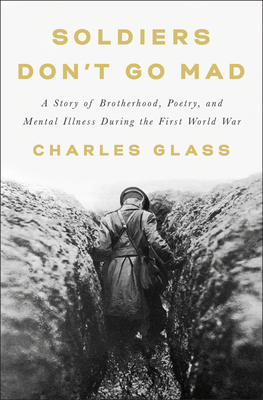Soldiers Don't Go Mad: A Story of Brotherhood, Poetry, and Mental Illness During the First World War

Soldiers Don't Go Mad: A Story of Brotherhood, Poetry, and Mental Illness During the First World War
A brilliant and poignant history of the friendship between two great war poets, Siegfried Sassoon and Wilfred Owen, alongside a narrative investigation of the origins of PTSD and the literary response to World War I From the moment war broke out across Europe in 1914, the world entered a new, unparalleled era of modern warfare. Soldiers faced relentless machine gun shelling, incredible artillery power, flame throwers, and gas attacks. Within the first four months of the war, the British Army recorded the nervous collapse of ten percent of its officers; the loss of such manpower to mental illness - not to mention death and physical wounds - left the army unable to fill its ranks. Second Lieutenant Wilfred Owen was twenty-four years old when he was admitted to the newly established Craiglockhart War Hospital for treatment of shell shock. A bourgeoning poet, trying to make sense of the terror he had witnessed, he read a collection of poems from a fellow officer, Siegfried Sassoon, and was impressed by his portrayal of the soldier's plight. One month later, Sassoon himself arrived at Craiglockhart, having refused to return to the front after being wounded during battle. Though Owen and Sassoon differed in age, class, education, and interests, both were outsiders - as soldiers unfit to fight, as gay men in a homophobic country, and as Britons unwilling to support a war likely to wipe out an entire generation of young men. But more than anything else, they shared a love of the English language, and its highest expression of poetry. As their friendship evolved over their months as patients at Craiglockhart, each encouraged the other in their work, in their personal reckonings with the morality of war, as well as in their treatment. Therapy provided Owen, Sassoon, and fellow patients with insights that allowed them express themselves better, and for the 28 months that Craiglockhart was in operation, it notably incubated the era's most significant developments in both psychiatry and poetry. Drawing on rich source materials, as well as Glass's own deep understanding of trauma and war, Soldiers Don't Go Mad tells for the first time the story of the soldiers and doctors who struggled with the effects of industrial warfare on the human psyche. Writing beyond the battlefields, to the psychiatric couch of Craiglockhart but also the literary salons, halls of power, and country houses, Glass charts the experiences of Owen and Sassoon, and of their fellow soldier-poets,
PRP: 179.80 Lei
Acesta este Prețul Recomandat de Producător. Prețul de vânzare al produsului este afișat mai jos.
161.82Lei
161.82Lei
179.80 LeiIndisponibil
Descrierea produsului
A brilliant and poignant history of the friendship between two great war poets, Siegfried Sassoon and Wilfred Owen, alongside a narrative investigation of the origins of PTSD and the literary response to World War I From the moment war broke out across Europe in 1914, the world entered a new, unparalleled era of modern warfare. Soldiers faced relentless machine gun shelling, incredible artillery power, flame throwers, and gas attacks. Within the first four months of the war, the British Army recorded the nervous collapse of ten percent of its officers; the loss of such manpower to mental illness - not to mention death and physical wounds - left the army unable to fill its ranks. Second Lieutenant Wilfred Owen was twenty-four years old when he was admitted to the newly established Craiglockhart War Hospital for treatment of shell shock. A bourgeoning poet, trying to make sense of the terror he had witnessed, he read a collection of poems from a fellow officer, Siegfried Sassoon, and was impressed by his portrayal of the soldier's plight. One month later, Sassoon himself arrived at Craiglockhart, having refused to return to the front after being wounded during battle. Though Owen and Sassoon differed in age, class, education, and interests, both were outsiders - as soldiers unfit to fight, as gay men in a homophobic country, and as Britons unwilling to support a war likely to wipe out an entire generation of young men. But more than anything else, they shared a love of the English language, and its highest expression of poetry. As their friendship evolved over their months as patients at Craiglockhart, each encouraged the other in their work, in their personal reckonings with the morality of war, as well as in their treatment. Therapy provided Owen, Sassoon, and fellow patients with insights that allowed them express themselves better, and for the 28 months that Craiglockhart was in operation, it notably incubated the era's most significant developments in both psychiatry and poetry. Drawing on rich source materials, as well as Glass's own deep understanding of trauma and war, Soldiers Don't Go Mad tells for the first time the story of the soldiers and doctors who struggled with the effects of industrial warfare on the human psyche. Writing beyond the battlefields, to the psychiatric couch of Craiglockhart but also the literary salons, halls of power, and country houses, Glass charts the experiences of Owen and Sassoon, and of their fellow soldier-poets,
Detaliile produsului










